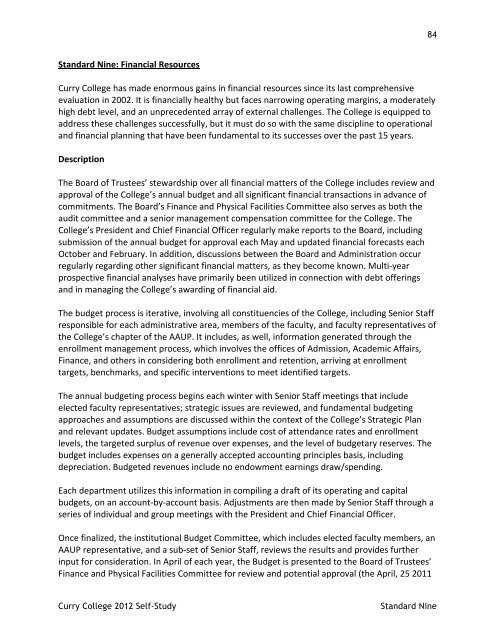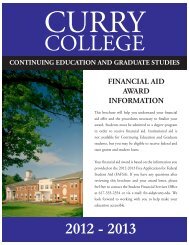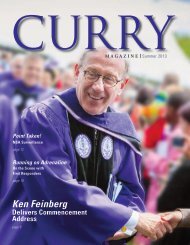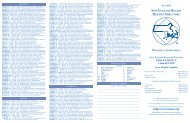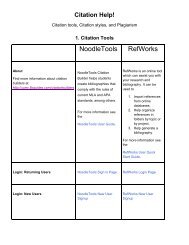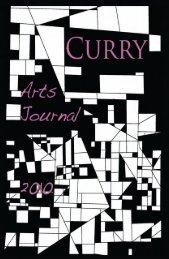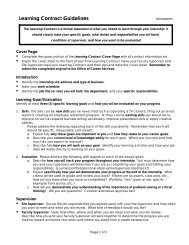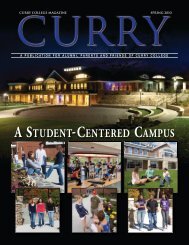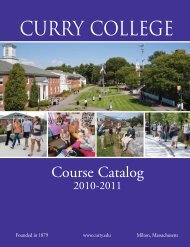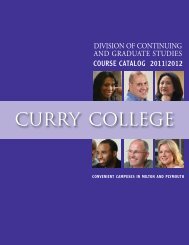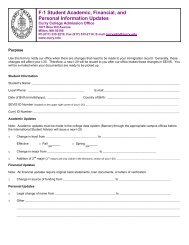Read the Curry College NEASC 2012 Self-Study Report.
Read the Curry College NEASC 2012 Self-Study Report.
Read the Curry College NEASC 2012 Self-Study Report.
Create successful ePaper yourself
Turn your PDF publications into a flip-book with our unique Google optimized e-Paper software.
84<br />
Standard Nine: Financial Resources<br />
<strong>Curry</strong> <strong>College</strong> has made enormous gains in financial resources since its last comprehensive<br />
evaluation in 2002. It is financially healthy but faces narrowing operating margins, a moderately<br />
high debt level, and an unprecedented array of external challenges. The <strong>College</strong> is equipped to<br />
address <strong>the</strong>se challenges successfully, but it must do so with <strong>the</strong> same discipline to operational<br />
and financial planning that have been fundamental to its successes over <strong>the</strong> past 15 years.<br />
Description<br />
The Board of Trustees’ stewardship over all financial matters of <strong>the</strong> <strong>College</strong> includes review and<br />
approval of <strong>the</strong> <strong>College</strong>’s annual budget and all significant financial transactions in advance of<br />
commitments. The Board’s Finance and Physical Facilities Committee also serves as both <strong>the</strong><br />
audit committee and a senior management compensation committee for <strong>the</strong> <strong>College</strong>. The<br />
<strong>College</strong>’s President and Chief Financial Officer regularly make reports to <strong>the</strong> Board, including<br />
submission of <strong>the</strong> annual budget for approval each May and updated financial forecasts each<br />
October and February. In addition, discussions between <strong>the</strong> Board and Administration occur<br />
regularly regarding o<strong>the</strong>r significant financial matters, as <strong>the</strong>y become known. Multi‐year<br />
prospective financial analyses have primarily been utilized in connection with debt offerings<br />
and in managing <strong>the</strong> <strong>College</strong>’s awarding of financial aid.<br />
The budget process is iterative, involving all constituencies of <strong>the</strong> <strong>College</strong>, including Senior Staff<br />
responsible for each administrative area, members of <strong>the</strong> faculty, and faculty representatives of<br />
<strong>the</strong> <strong>College</strong>’s chapter of <strong>the</strong> AAUP. It includes, as well, information generated through <strong>the</strong><br />
enrollment management process, which involves <strong>the</strong> offices of Admission, Academic Affairs,<br />
Finance, and o<strong>the</strong>rs in considering both enrollment and retention, arriving at enrollment<br />
targets, benchmarks, and specific interventions to meet identified targets.<br />
The annual budgeting process begins each winter with Senior Staff meetings that include<br />
elected faculty representatives; strategic issues are reviewed, and fundamental budgeting<br />
approaches and assumptions are discussed within <strong>the</strong> context of <strong>the</strong> <strong>College</strong>’s Strategic Plan<br />
and relevant updates. Budget assumptions include cost of attendance rates and enrollment<br />
levels, <strong>the</strong> targeted surplus of revenue over expenses, and <strong>the</strong> level of budgetary reserves. The<br />
budget includes expenses on a generally accepted accounting principles basis, including<br />
depreciation. Budgeted revenues include no endowment earnings draw/spending.<br />
Each department utilizes this information in compiling a draft of its operating and capital<br />
budgets, on an account‐by‐account basis. Adjustments are <strong>the</strong>n made by Senior Staff through a<br />
series of individual and group meetings with <strong>the</strong> President and Chief Financial Officer.<br />
Once finalized, <strong>the</strong> institutional Budget Committee, which includes elected faculty members, an<br />
AAUP representative, and a sub‐set of Senior Staff, reviews <strong>the</strong> results and provides fur<strong>the</strong>r<br />
input for consideration. In April of each year, <strong>the</strong> Budget is presented to <strong>the</strong> Board of Trustees’<br />
Finance and Physical Facilities Committee for review and potential approval (<strong>the</strong> April, 25 2011<br />
<strong>Curry</strong> <strong>College</strong> <strong>2012</strong> <strong>Self</strong>-<strong>Study</strong><br />
Standard Nine


